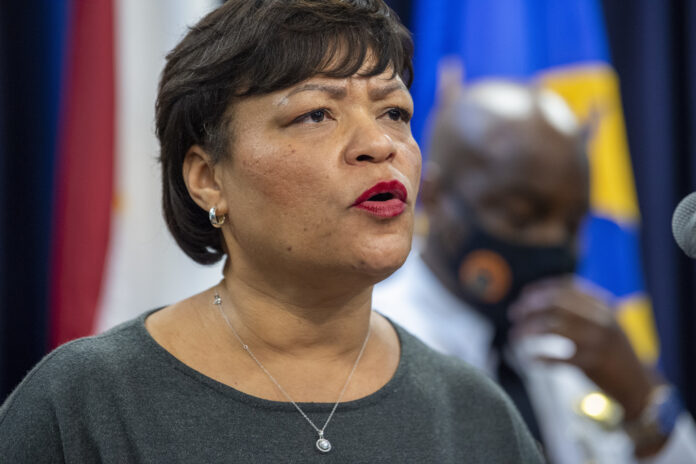
Recall petition signatures were gathered during Mardi Gras parades. A brass band played and people danced on the sidewalk as organizers lugged boxes of signatures into City Hall. Disgruntled residents complained that dead people were still populating the voter rolls. It was political tumult, Louisiana style.
In the end, the effort failed. The petition to force Mayor LaToya Cantrell into a recall election resulted in only 27,243 valid signatures, state officials announced Tuesday — about 18,000 short of what organizers needed.
“Clearly, a weight lifted,” Cantrell, the city’s first woman mayor, said at a Wednesday news conference. She also made it clear she doesn’t think her political battles are over.
“There’s been intentional orchestration to discredit me, and my role as mayor of the City of New Orleans, and I do not expect that to stop,” she said.
From the petition drive’s beginning in August, Cantrell supporters have portrayed it as a Republican-led effort to drive a successful Black Democratic woman from office.
“That’s a fair characterization, but that’s not the only characterization,” said Robert Collins, a local political analyst who is a professor of urban studies and public policy at Dillard University.
One prominent Republican businessman put up more than $1 million of the nearly $1.2 million raised for the campaign, according to state records. And an analysis of signatures by The Times-Picayune/The New Orleans Advocate showed support for the recall was much higher in predominantly white areas.
But the initiators of the recall were Black Democrats Eileen Carter and Belden Batiste. And there is dissatisfaction with Cantrell among some Black voters, said Collins. “If it was just white folks and a rich guy, you wouldn’t even have come close to the number of signatures that they had,” he said.
University of New Orleans political scientist Ed Chervenak also indicated that the issue is not that clear-cut.
“It’s kind of difficult to paint it one way or the other,” he said.
Cantrell took office in 2018 and had a first-year approval rating of 57%, according to a periodic survey of voter attitudes by the University or New Orleans Survey Research Center. That plummeted to 31% in a poll the university released in October.
She had first gained notice in New Orleans after levee failures during Hurricane Katrina inundated most of the city in 2005. She became an activist for the devastated Broadmoor neighborhood, helping scuttle early plans to raze what was left there and turn the area into a park and floodway. She was elected twice to the City Council and that led to her winning the race to succeed former Mayor Mitch Landrieu early in 2018.
Her first-term successes included pushing the state Legislature to collect more hotel taxes for the tourism-dependent city. Her handling of the COVID-19 crisis was generally well received. She drew no strong opposition in her 2021 election for a second term, not long after Hurricane Ida caused heavy damage in the city.
But trash collection problems that grew in the aftermath of Ida lingered into her second term. So did crime — the greatest concern of voters who responded to the poll — and frequent complaints about the slow pace of street improvement projects that left many streets a mess.
Meanwhile, Cantrell drew criticism for taking first-class trips abroad at city expense, violating a policy that requires city employees to use cheaper fares. She eventually agreed to repay the difference.
There was also WVUE television’s investigation showing she was using a city-owned apartment as a part-time residence. Former mayors said it was not to be a mayoral residence but a place for visiting dignitaries to say.
It also led to questions about her relationship with a member of her security team, frequently seen at the apartment. “Strictly professional,” was the way Cantrell described it Wednesday.
Chervenak said Cantrell appeared to develop a “sense of entitlement” in her second term.
“I guess she started feeling she was bulletproof,” Collins said.
Throughout the recall campaign and the mounting criticism, Cantrell has denied that she has been anything but laser-focused on all of the city’s problems. She read statistics at Wednesday’s news conference indicating downward trends in most violent crimes.
“Throughout it all, it’s been focusing on doing the work,” Cantrell said.
The battles aren’t over. The mayor said her legal team won’t stop challenging a court agreement that lowered the number of valid signatures needed for a recall petition by about 5,000 votes. Recall organizers had pushed for the lower threshold through a lawsuit. They said requiring the signatures of 20% of the city’s qualified voters didn’t work because the current voter rolls were inflated. According to them, the rolls still contained the names of hundreds of dead people and thousands who had moved out of the city.
Cantrell supporters said Republican Secretary of State Kyle Ardoin had no authority to enter into the settlement. They also noted the revelation by The Times-Picayune/The New Orleans Advocate that the judge who approved the settlement had signed the petition.
Recall organizers, meanwhile, could challenge any of the various reasons the New Orleans registrar had for invalidating thousands of signatures on the petition.
Cantrell, now term-limited, faces a second term as a lame duck with a City Council that has been showing it’s desire for more authority — including with its passage of a measure giving the council confirmation authority over her appointments. Among the battles that portends is one over the selection of a new police chief, which previously had been solely within the mayor’s purview.


